No Game No Life: Post-Modern Detectives
Postmodern detective fiction crosses a wide array of mediums, including – but not limited to – literature, film, and television. One of my favorites being Japanese animation, or anime. No Game No Life is an anime about two unsocial child prodigy siblings – Sora, who uses his astute intuition and penetrating insight, and Shiro, who uses her remarkable intellect to dominate the online gaming world through a group of character aliases known collectively as “Blank.” One day, they are challenged by an un-named stranger to a game of chess. With their victory, they are offered a choice to be reborn into a new world. Feeling weary of the real world, the siblings accept the offer, and are pulled into a fantasy world that is ruled by games, called Disboard.
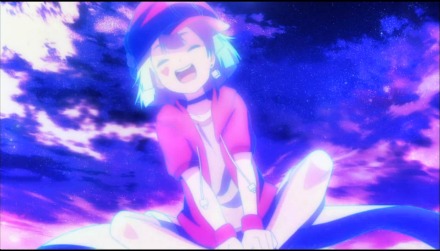
Tet, their former chess opponent and last remaining god of Disboard, tells the siblings of the Ten Oaths that govern the world of Disboard, challenging the siblings to try and thrive within his world of games. The siblings set out on a journey to advance through the hierarchies of the world to help redeem the weak human race and challenge Tet for his title of “One True God.” Through their intensive investigations, bizarre methods, and risky challenges to the other nations, the siblings portray excellent examples of the postmodern detective genre.
No Game No Life portrays many of the attributes of the postmodern detective genre and its affiliates, such as: abstract theorization, “the ability to analyze information, detect patterns and relationships, and solve problems on a complex, intangible level” (Williams), empirical observation, which are observations “based on testing or experience,”deduction, “2 a: the deriving of a conclusion by reasoning,” and induction, which is defined as “2 a (1): inference of a generalized conclusion from particular instances” – as defined by Merriam-Webster Dictionary.
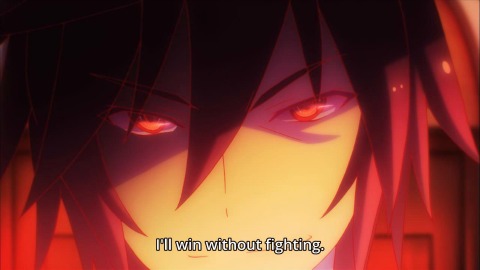
Postmodernism
Postmodernism is defined as a 20th century philosophy “characterized by broad skepticism, subjectivism, or relativism; a general suspicion of reason; and an acute sensitivity to the role of ideology in asserting and maintaining political and economic power” (Duignan). One of the many important doctrines of this philosophy include the belief that reality is an article of scientific practice and language. Another is the disbelief that science and technology are implements of human progress, as Brian Duignan mentions, “Some go so far as to say that science and technology—and even reason and logic—are inherently destructive and oppressive, because they have been used by evil people, especially during the 20th century, to destroy and oppress others.” Yet another doctrine comprises the belief that the elite of society determine social categories and popular language (Snell). Other viewpoints include the skepticism of reason and logic, the rejection of philosophical foundationalism, and the belief that nearly all aspects of the human psychology are socially determined. This form of philosophy has been incorporated into many types of literature over time, including fiction; in particularly, detective fiction.
Peter Hühn claims that “Detective fiction, particularly of the classical formula, seems to be unique among narrative genres in that it thematizes narrativity itself as a problem, a procedure, and an achievement.” Detective fiction is particularly known for its very particular structure which commonly consists of the reconstruction of a hidden or lost story; but, the narrative itself comprises two separate stories: the story of the crime (which involves action) and the story of the investigation (which in related with knowledge) (Hühn), and the narrative intertwines the two. The crime story is in the past, and the investigation story, which consists of uncovering the first story, is the present. The combination of these stories is presented in a specific way, which is said to have been invented by Edgar Allen Poe and standardized by Arthur Conan Doyle. Hühn refers to Gerard Genette’s and Seymour Chatman’s distinction between story and discourse to define the narrative organization of a detective novel, stating that the usual relation between story and discourse occurs twice: the story of the crime is uncovered through the detective’s investigation, and the story of the detective’s investigation is uncovered through the narration (Hühn).
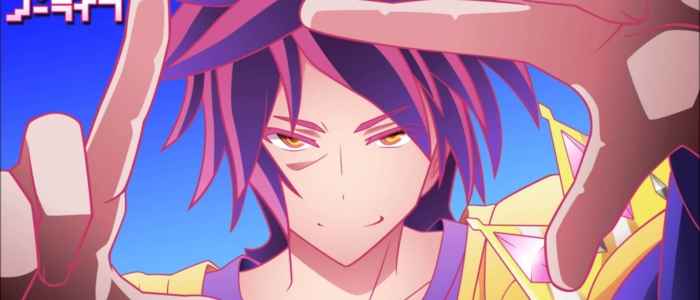
The evolution of the detective fiction genre has expanded since the time of Poe and Doyle, comprised of various subcategories that characterize specific detective characters. The Arm-Chair Detective thinks through mysteries without gathering evidence. The Hard-Boiled Detective usually has a foul demeanor due to an unpleasant past. The Police Procedural genre involves law enforcement groups working together to solve crimes. Lastly, the Postmodern Detective is generally unrealistic, uses irrational methods, and their investigations don’t make sense, except perhaps, only to themselves. Richard Swope discusses the differences between the common detective genre and the postmodern detective genre, incorporating the history of postmodernism and its doctrines into his theory that postmodern detective fiction “evokes the impulse to ‘detect’ and/or to psychoanalyze in order to violently frustrate it by refusing to solve the crime” (qtd. in Swope). Postmodern detective fiction is not neat and organized, where all questions are answered; instead, questions remain at the end, any clues uncovered simply lead to broader clues, and there is no closure much like the methods used by Sora and Shiro, the two main characters of No Game No Life.
Postmodern Detectives
The world of Disboard is a world that is ruled entirely by games; even national borders. The human race, called Imanity, has found itself in a dire situation. The last king of Imanity was seen as foolish and reckless, one who did not act for the good of his people. He challenged other nations, betting Imanity’s resources, and with continuous losses, eventually squandered away everything that was of any use to the Imanity society, including much of their territory. The other nations backed the human race into a corner, compressing them all into the last remaining Imanity city, Elkia. The king declared on his deathbed, the next ruler of Elkia would be “the best gambler” (Hanada), so the kingdom arranged a city-wide competition that would decide who would take the throne. When Sora and Shiro arrive in Disboard, they have no official goal, aside from surviving; but, after witnessing the game between the late king’s granddaughter, Stephanie Dola, and the running top contender in the competition, Kurami Zell, they use deduction to realize that Kurami is cheating, which is strictly against the rules of Disboard. With her loss, Stephanie asks for the siblings’ help in taking back her kingdom. Sora and Shiro decide to challenge Kurami for the throne, publically announcing their challenge in the middle of her coronation, and accuse her of using Elf magic to help secure the throne. Kurami admits to this, saying that she is working with the Elves to secure more territory and protection for Imanity, and asks the siblings to withdraw from their challenge. But, the children refuse, and continue on to play Kurami’s game of chess, where the pieces have wills of their own.
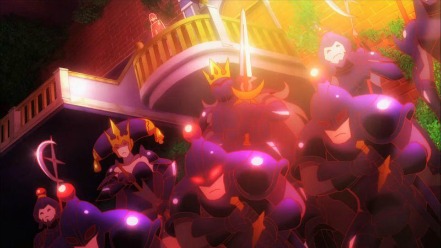
Realizing that this game cannot be won by sheer tact, Sora uses abstract theorization- which consists of psychological reasoning to devise a plan to trick the chess pieces into switching sides, which is something that Kurami’s Elf magic cannot control. With their victory, Sora and Shiro take the throne and begin their journey to restore Imanity.
The siblings’ motives are questioned in the beginning of their rule, as Stephanie Dola ridicules them for sitting around and reading books. She accuses them of going against their word and betraying their promise to restore her kingdom, but the case had been that they were actually reading the kingdom’s archives to get more information on the circumstances that befell Imanity when it was forced into its current position. They admit to this when they embark on a journey to retrieve a library that was wagered in a game against a member of the Flügel race; an angel-like race that thrives for knowledge. Sora and Shiro challenge Jibril, the guardian of the library, and partake in a game of Materialization Shiritori, where the players must call out words that begin with the last letter of the previous word and the object will materialize.
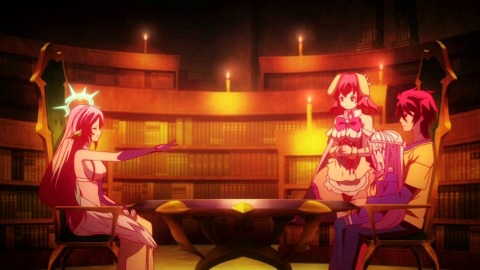
Sora, using his remarkable induction skills, distracts Jibril long enough to trick her into thinking that he is calling out random words, to eventually trapping her in the explosion of a star. Sora outwits Jibril, winning back the library, along with Jibril’s allegiance.
Sora then decides to challenge the Warbeast race. Upon realizing that the Warbeasts have a talent for erasing the memory of every challenger who participates in their game, the siblings uncover the late king’s research on how to outwit the Warbeasts. Sora arranges several games to set up his advantages in preparation for challenging the Warbeasts, which include the control over Kurami’s Elf partner, Fil. Sora bets Imanity’s race piece, which, if lost, would leave Imanity defenseless, and no longer under the protection of the Ten Oaths. The game the Warbeasts proposed was a virtual video game, which the siblings had deduced beforehand due to the Warbeasts being the most technologically advanced of all the nations. The game consisted of a Tag-like chase, where the opponents shoot each other with brain-washing guns to change the players’ allegiances. The first player to lose all of their teammates, including themselves, lost the game. Throughout the game, Sora and Shiro tag-team their intelligence to outwit their opponent, until they reach a standstill, and Shiro is captured by their opponent. Sora is left with Shiro’s mathematical calculations and faith in his sister to win the game.
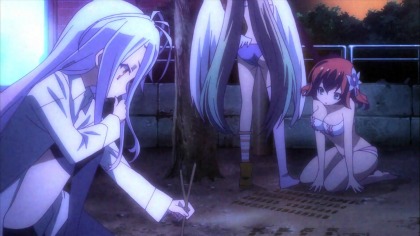
Shiro had come to understand the functions of the game well enough to calculate as far into the future to predict where an NPC (Non-Player Character) of the game would be moving at the very specific time that they would battle their opponent. This particular NPC was carrying Stephanie, and once their opponent had taken out Sora and Shiro, Stephanie would end the game. With Shiro’s accurate empirical observations, the siblings were able to manipulate the game to secure a favorable outcome for themselves, winning back their territory and resources from the Warbeasts, and eventually creating an alliance with the Warbeasts leader.
No Game No Life shows characteristics of the postmodern detective genre through the sibling’s actions as their investigation progresses in order to restore the human race. The siblings have unique attributes of their intelligence; Sora who is more in tune with abstract theorization and psychological reasoning, and Shiro who is keen on the physical properties of intellect and empirical observations. Together, they perform multiple cases of induction and deduction in order to gain the information they need to help Imanity rebuild itself. The irrational and unrealistic methods the siblings use confuse their allies, making them seem as if they have ulterior motives – that consist of nothing more than taking over the world for their own satisfaction – when all the while, they had the interest of Imanity and how to restore it for the sake of the people in mind, and they let that lead their investigation. These characteristics of the siblings make their story postmodern, and their investigations, misleading as they may seem, make them detectives. Therefore, No Game No Life can be considered as a part of the postmodern detective fiction genre.
Works Cited
Duignan, Brian. “Postmodernism.” Encyclopedia Britannica. 2014.
Hanada, Jukki. “No Game No Life.” 9 April 2014. Web.
Hühn, Peter. “The Detective as Reader: Narrativity and Reading Concepts in Detective Fiction.” MFS Modern Fiction Studies (1987): 451-466. Web.
Snell, Joel. “Chaos Theory and Postmodernism.” Education (2009): 274-276. Web.
Swope, Richard. “APPROACHING THE THRESHOLD(S) IN POSTMODERN DETECTIVE FICTION: HAWTHORNE’S “WAKEFIELD” AND OTHER MISSING PERSONS .” Critique (1998): 207-227. Web.
Williams, Yolanda. “Abstract Reasoning: Definition & Examples.” Study.com. Web. 13 Jan. 2016. <http://study.com/academy/lesson/abstract-reasoning-definition-examples-quiz.html>.
What do you think? Leave a comment.




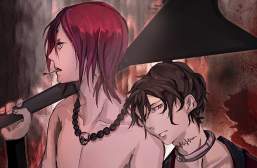


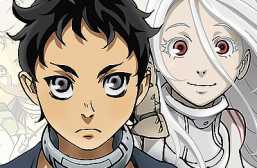
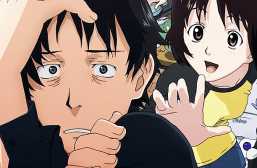
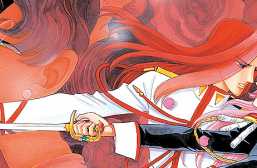
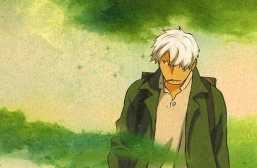
I love Sora and Shiro. Shiro, even though the show kind of doesn’t respect her, is THE best loli character, EVER. Sora is a more comical version of Kira; yes, I know that they are not that similar, but I just feel the same I felt with Kira when I see Sora win a game. Tet is just 2cool4u; he is god, literally. I WANT A SECOND SEASON, MADHOUSE.
I agree!
This anime series is by far the most interesting and funny show that I’ve ever seen. This series needs all the support it can get in order to help it realize it’s massive amount of potential! Thank you so much for this analysis!
I completely agree, and that is one of the reasons why I chose to write this! Thank you so much for reading!
Wonderful thesis. I have never loved characters of an anime so quickly like in No Game No Life.
I fell in love with them, too! Thank you very much for reading!
This is such a fun and extremely well thought out show, the concept is so basic and straight forward that you don’t think it could be portrayed so well.
I agree with you! I believe the unique characters play a big role in making this anime so fantastic! Thank you for reading!
I stopped watching around episode 6, I don’t quite understand the hype around this anime, their wins feel like asspull, there’s too much fanservice almost to the point of pedophilia, the supporting characters are bland arch-type and the MCs are stereotypical OP Asspull Kirito-type (coincidentally voice by Kirito’s voice actor?). The story seems idiotic right from the first episode onward, the only good thing I can say about this anime is the unique visual.
I appreciate your comment, and your opinion on the anime. This kind of anime isn’t always for everyone! But, thank you for taking the time to read my article, I appreciate it!
Thanks for the really enjoyable read on one of my favorite anime. I wonder if you would enjoy animes like Life Is Still Beautiful. It’s a very simple and sweet anime. Although the main romance is a bit weird (creepy or gross to some maybe) since it is between an older girl (approx 18-20) and a younger spoiled brat (approx 12-14). The show sets him up as a young kid with an older mind and mostly I think it works. Also if I remember correctly, it’s a show free of boob references and perverted shit like that so that’s a plus. I’d recommend it to you just because I found it very enjoyable as something I could watch with a satisfying (and well told) storyline, nice characters and a bit of supernatural (she can make it rain when she sings). It’s fairly short but very enjoyable.
Thank you so very much! I have actually been planning on watching that anime- hopefully I will get around to it sometime soon! Thank you for reading!
If anyone wants anything more similar to No Game No Life check out “Mondaiji-tachi ga Isekai kara Kuru Sou Desu yo?”
I feel as if Steph is intelligent. But she is extremely naive and foolish.
Loved the concept and visuals and your analysis of the anime, but hated the characters and fanservice.
I agree with you, the fanservuce was a bit distracting, but my main reason for this analysis was to show others that there is a tangible plot, and there is intelligence behind all of it. I’d like people to start looking past the fan service before judging the quality of the anime. Thank you so much for reading, and for your comment!
Am I the only one not bothereb by Shiro’s pantyshot? I mean panties aren’t that big a deal to me. But maybe that’s just that I’ve read Needless, which seems to contain only one girl/woman who’s not a loli and they measure damage taken as how much of their clothes has been destroyed.
The anime was actually really good. The plot was also solid and the ideas were absolutely wonderful. Sad thing is, the load of fan service ruined the anime. It was especially awkward watching the panty-shots of the girl.
I agree! While the fan service was rather distracting, I appreciate those who can acknowledge the quality behind the plot. Thank you for reading and for your comment!
Thank you for the article. About to start watching it again for the third time. Can’t wait for season 2!
How can anybody, in the right mind, consider this to be any good? The two main characters, Sora and Shiro, parade Steph around like she is their dehumanized slave. They treat all of the other female main characters like trash. The only thing that I found even remotely interesting was that, in one of the episodes, they did a brief parody of “Castle in the Sky” when one of the protagonists made a reference about Laputa.
I agree that the fan service is rather unnecessary, and I appreciate your opinion, as it is a popular one. But, as I have mentioned before, my main reason for writing this article was to show others that there is a tangible plot and to analyze the intelligence behind it, so that it doesn’t have a completely bad rap for all the boobs and panties. But, I appreciate your comment, and thank you for taking the time to read my article!
Love reading anime studies here. NGNO definitely has some of the most epic soundtracks I’ve heard from any show.
There is one big problem I found when watching No Game No Life, this problem might not really be a problem for everyone but it is one for me. The problem is that Shiro beat Tet in the first episode. Shiro and Sora get into that world after Shiro beat Tet in chess. This means that Shiro and Sora can beat everyone, this is annoying.
I really liked this anime but I hated Steph, I felt like she was annoying and naive and got upset because she was being slow or someone was bad mouthing her granddad. Yea she was smart in like two episodes but to me she was a burden :\. To me the anime would’ve been better without her (Or maybe just developed her better) because she was just there for the fan service and ”plot”
This show was Madhouse flexing its muscles in so many ways.
I was really surprised by this anime. I wasn’t expecting much from it, but its funny and surprisingly smart.
This is a very interesting article! I enjoyed the NGNL series and have even started reading the novels. Very well done.
I like this series because of the planning the characters do. I love waiting for them to win so they can explain how they won. Just seeing how they are reading so far ahead is just … YESSSSSS!
Great post! What really made this series for me was the clever writing and world that was created for setting the stage. Not to mention both Shiro and Sora are very unique personalities that frequently kept me laughing!
What a great show!! I can’t wait for them to make the next season!
I liked this series far more than I expected and hope there is more to follow.
There’s been a strange transition for anime in the last 10 years. Gone are the gritty movies that showcase violence, sex, philosophy, and push the envelope for standard movie conventions. Instead, series are now being pumped out an alarming rate that attempt to do these things at once, but never truly do. No Game, No Life as a whole exemplifies this trend, magnified threefold.
episode 6 was one of my favorite ‘smart twist the villain didn’t see coming using science’ because it wasn’t just technobabble but something actually sciencey!
The show was fantastic, although Shiro’s fanservice is ridiculous, but that ending was just so painful. I remember not being sure if I actually had just watched the ending or if there was another episode, but no, it was the ending. And it was just so stupid.
I never thought about the post-modern angle in No Game, No Life but definitely fits. Well written article.
No Game No Life is one of my favorite anime series, and I was very excited to see and article on it. I think you captured the spirit of the anime very well in this piece, and did an excellent job summarizing the major plot points and showing how they worked with your thesis. A good read, definitely makes me want to go rewatch the show with these new thoughts in mind.
I disagree with No Game No Life being a detective series because fundementally, its not. The anime does show the process of Sora And Shiro’s deduction, dut ultimatly, it falls under the catagory of a game anime. I mean, it has the word “game” in the title for crying out loud. The focus of the anime isn’t on the gathering of clues or solving the mystery of how their opponents cheat, it is about the game.
I’ll admit that there are elements of mystery such as finding the previous king’s hidden clues regarding the warbeasts, but this is just information gathering for the fight. I would turn to how Sora and Shiro say that they “always take games seriously” as part of the explanation to this. Games aren’t for fun to them, games are more like war and a crucial part of any battle is knowing your opponent. That is why Sora and Shiro seek information. Not to solve the mystery, but to win the game.
There is also more of a problem and solution model than a mystery and and investigation model. There is no mystery as to wether Kuromin is cheating or not as this is immediatly solved duduced. It is how they deal with, or fight against her cheating that is the problem. Also, the game they are playing is a simulated war. Get it? its a battle of wits and strategy against their opponent, not a search for the solution.
I would also like to point to the case of the battle against Jibril as they did no investigation whatsoever before they challenged her. They didn’t even know what she looked like but still challenged her for the prize. Their game wasn’t a mystery but a competition between the two parties.
I definitely agree that the anime is post-modern, but I cannot say that it fits the definition of detective mystery. I agree that it has some searching and unknown elements but those are not the focus of the story. The focus of the story is the games that Sora and Shiro play which closer resemble a battle or war than a mystery. A comparison I would make is that No Game No Life is rather like Death Note ( though with an EXTREMELY different tone) in that the plot is focused on the intellectual struggles of the protagonist against their opponent.
Ugh this anime is so amazing! I never really thought of the anime thoroughly as a postmodern detective storyline, but the way you break it down makes so much sense. Astonishing.
This is a great anime and the second season can’t come fast enough. I enjoyed your thesis as well and it has made me want to rematch the series keeping this post-modern detective theory in mind!
I’ve never thought of this show as postmodern detectives, so this is an interesting take!